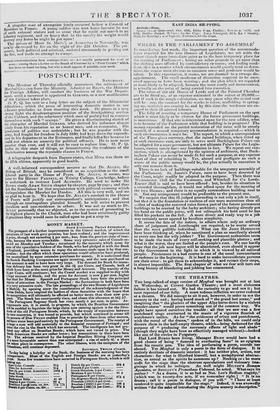WHERE IS THE PARLIAMENT TO ASSEMBLE'
Is cobsidering, last week, the important question of the accommoda- tions required for the two Houses of Legislature, we set aside the minor though more immediate point as to the best temporary place for the meeting of Parliament ; having no other grounds to go upon than the shifting ones afforded by contradictory rumours; and feeling confi- Leo, ilea in a matter which circumstances would greatly tend to deter- mine, the course most obvious to common sense and prudence would be taken. In this expectation, it seems, we are doomed to a strange dis- appointment. The small modicum of discretion required to be exer- cised appears to have been wanting ; and the plan which we regarded as least likely to be adopted, because the most costly and inconvenient, is actually on the point of being carried into execution. The runis of the old House of Lords and of the Painted Chamber are to be fitted up, at an expense estimated in the outset at 39,000/.— and if such is the rough calculation, we may guess what the actual cost will be : nay, the contract for the works is taken, scaffolding is spring- ing up, materials are coming in, and by this time the workmen are en- gaged in their ilL advised labours.
The folly of erecting at temporary House of Parliament on the spot which is most likely to be chosen for the future permanent buildings, is monstrous. If that site is determined upon for the new edifice, what is to become of the Parliament while that building is in progress? The money expended on the partial restoration of the ruins will be utterly masted, if a second temporary accommodation is required — which in such circumstances it must be. The report, to which a correspondent of the Tunes gives currency, that the ruined buildings, when fitted up at such enormous cost, are only to serve until Buckingham Palace can be adapted for a more permanent, but not ultimate Palace for the Legis- lature, cannot surely have any foundation in fact. We repeat our con- viction, which is strengthened by the opinion of architects, that Buck- ingham Palace can never be made fit for such a purpose, at any expense short of that of rebuilding it. Yet, absurd and profligate as such a waste of the public money would be, the plan actually in execution is only one remove from it.
There is no lack of buildings suitable for the temporary assembly of the Parliament. St. James's Palace, soon to have been deserted by the Court, might readily be adapted to the purpose. Then there was Westminster Hall for the Commons, and Whitehall for Oe Lords. Exeter Hall is said to have been offered : but, besides its situation in a crowded thoroughfare, it would not afford space for the meeting of the two Houses ; and there is no equally commodious building near to it. But any arrangement would be preferable to the present one. We suspect that this ill-judged proceeding is not only a job in itself, but that it is the foundation or nucleus of one more monstrous than all —that of making the restored ruins form a part of the future permanent buildings to be erected by the lucky architect; who having already got his hand on the public purse, will not relinquish his hold until he has filled his pockets to the full. A more direct and ready way to a job was certainly never opened by heedless simplicity.
It seems the fate of the nation, in affairs where only an ordinary share of judgment and forethought are required, to be worse served than the most gullible individual. What can Sir JOHN HOBHOUSE have been thinking of, when he sanctioned a plan so manifestly absurd to every one but the wily jobber? The Government authorities seem to be made the tools of every self-seeking and plausible plotter ; and what is the worst, they are fooled at the people's cost. We can hardly hope that the job now begun will be abandoned, even should it appear to the Government in the light in which it is viewed by all rational people. Persistence in a bad course is one of the usual concomitants of rashness in the beginning. It is bard to make inconsiderate persons see their error: to get them to acknowledge it, and retract their steps, is almost impossible. The first chapter of what we fear will turn out a long history of blundering and jobbing has commenced.


























 Previous page
Previous page